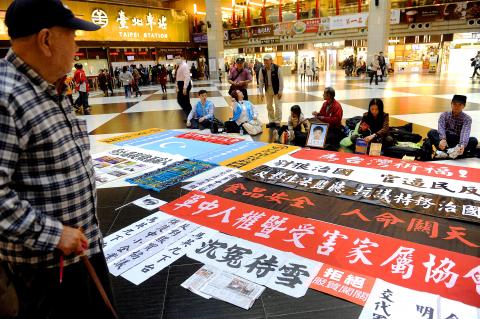The Taiwan Friends of Uighurs (TFU) has joined the cause voiced by the World Uyghur Congress (WUC) in calling for an end to the Chinese government maltreatment of Uighurs by staging a sit-in demonstration at Taipei Main Station.
The group, founded in June last year, said it received a call from WUC president Rebiya Kadeer on Friday afternoon informing it of the worldwide demonstration that has been scheduled to take place in Taiwan, Germany, Japan, Netherlands, Sweden, US and Canada between Friday and tomorrow.
According to a statement on the congress’ official Web site, the demonstration “seeks to draw attention to the Chinese government’s systematic human rights violations, especially extrajudicial killings, against Uighurs in East Turkestan,” also known as the Xinjiang Uighur Autonomous Region.

Photo: George Tsorng, Taipei Times
“We are hoping that the event will raise awareness of the suffering of the Uighur people under China’s rule among the Taiwanese public,” TFU executive director Marie Yang (楊月清) said yesterday.
“The Chinese government has continued to suppress minorities in China. Tibetans have received more public attention due to their world-renowned spiritual leader, the Dalai Lama, but Uighurs’ plight is less well known,” she said.
The relative inattention might have to do with the branding of the WUC by the Chinese government as a terrorist-related separatist organization and its leader “an ironclad separatist colluding with terrorists and Islamic extremists,” according to the Chinese Communist Party’s People’s Daily, along with the Taiwanese government’s ban on Kadeer’s entry into the nation in 2009 citing “security concerns.”
Yang called the accusation baseless.
“The WUC’s office is just a block away from the US Congress and the organization has also received funding from the US government,” Yang said.
TFU chairman Paul Lin (林保華) said there were at least 10 known incidents of bloodshed in the restive western autonomous region last year, adding that they were “bloodshed” rather than “terrorist attacks” as described by some Taiwanese, Hong Kong and overseas Chinese media repeating the Chinese government’s stance.
“However, the Chinese government has failed to ferret out a single gun from the resisting Uighur people in these ‘terrorist attacks.’ All they found were machetes, other kinds of knives and the so-called improvised explosive devices that were simply bottles filled with oil,” he said.
Lin mentioned an incident in 2012 that was claimed by the Chinese government to be a “hijack attempt,” which was in fact simply “a fight between six Uighurs and some Han Chinese on the plane.”
Two Uighur passengers died as the result of the fight, and the other four were arrested, of which three have since been executed, Lin said.
“The Chinese report later claimed the Uighurs involved had carried explosives onto the plane, but withdrew the accusation after receiving protests from the ground crew, who would be held accountable for negligence if the allegation was true.”
The Han people involved were praised as heroes and lavishly rewarded, which Lin described as “hush money.”
Lin called on Taiwanese to be aware of the human rights violations in China, especially at a time when Western democracies are bowing to Beijing’s economic power.

Chinese Nationalist Party (KMT) Chairman Eric Chu (朱立倫), spokeswoman Yang Chih-yu (楊智伃) and Legislator Hsieh Lung-chieh (謝龍介) would be summoned by police for questioning for leading an illegal assembly on Thursday evening last week, Minister of the Interior Liu Shyh-fang (劉世芳) said today. The three KMT officials led an assembly outside the Taipei City Prosecutors’ Office, a restricted area where public assembly is not allowed, protesting the questioning of several KMT staff and searches of KMT headquarters and offices in a recall petition forgery case. Chu, Yang and Hsieh are all suspected of contravening the Assembly and Parade Act (集會遊行法) by holding

PRAISE: Japanese visitor Takashi Kubota said the Taiwanese temple architecture images showcased in the AI Art Gallery were the most impressive displays he saw Taiwan does not have an official pavilion at the World Expo in Osaka, Japan, because of its diplomatic predicament, but the government-backed Tech World pavilion is drawing interest with its unique recreations of works by Taiwanese artists. The pavilion features an artificial intelligence (AI)-based art gallery showcasing works of famous Taiwanese artists from the Japanese colonial period using innovative technologies. Among its main simulated displays are Eastern gouache paintings by Chen Chin (陳進), Lin Yu-shan (林玉山) and Kuo Hsueh-hu (郭雪湖), who were the three young Taiwanese painters selected for the East Asian Painting exhibition in 1927. Gouache is a water-based

Taiwan would welcome the return of Honduras as a diplomatic ally if its next president decides to make such a move, Minister of Foreign Affairs Lin Chia-lung (林佳龍) said yesterday. “Of course, we would welcome Honduras if they want to restore diplomatic ties with Taiwan after their elections,” Lin said at a meeting of the legislature’s Foreign Affairs and National Defense Committee, when asked to comment on statements made by two of the three Honduran presidential candidates during the presidential campaign in the Central American country. Taiwan is paying close attention to the region as a whole in the wake of a

OFF-TARGET: More than 30,000 participants were expected to take part in the Games next month, but only 6,550 foreign and 19,400 Taiwanese athletes have registered Taipei city councilors yesterday blasted the organizers of next month’s World Masters Games over sudden timetable and venue changes, which they said have caused thousands of participants to back out of the international sporting event, among other organizational issues. They also cited visa delays and political interference by China as reasons many foreign athletes are requesting refunds for the event, to be held from May 17 to 30. Jointly organized by the Taipei and New Taipei City governments, the games have been rocked by numerous controversies since preparations began in 2020. Taipei City Councilor Lin Yen-feng (林延鳳) said yesterday that new measures by